|
|
|
Sort Order |
|
|
|
Items / Page
|
|
|
|
|
|
|
| Srl | Item |
| 1 |
ID:
064694
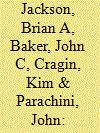

|
|
|
|
|
| Publication |
Santa Monica, Rand Corporation, 2005.
|
| Description |
xix, 84p.
|
| Standard Number |
0833037676
|
|
|
|
|
|
|
|
|
|
|
|
Copies: C:2/I:0,R:0,Q:0
Circulation
| Accession# | Call# | Current Location | Status | Policy | Location |
| 049899 | 303.625/JAC 049899 | Main | On Shelf | General | |
| 049900 | 303.625/JAC 049900 | Main | On Shelf | General | |
|
|
|
|
| 2 |
ID:
099423
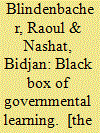

|
|
|
|
|
| Publication |
Washington, DC, World Bank, 2010.
|
| Description |
xx, 181p.
|
| Standard Number |
9780821384534
|
|
|
|
|
|
|
|
|
|
|
|
Copies: C:1/I:0,R:0,Q:0
Circulation
| Accession# | Call# | Current Location | Status | Policy | Location |
| 055311 | 352.669/BLI 055311 | Main | On Shelf | General | |
|
|
|
|
| 3 |
ID:
128302
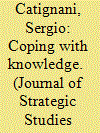

|
|
|
|
|
| Publication |
2014.
|
| Summary/Abstract |
This article - based on data that employs interviews conducted with British Army personnel - adopts a social theory of learning in order to examine how both formal and informal learning systems have affected organizational learning within the Army in relation to the counter-insurgency campaign in Afghanistan. It argues that while the Army has adopted new, or reformed existing, formal learning systems, these have not generated a reconceptualization of how to conduct counter-insurgency warfare. It, furthermore, argues that while informal learning systems have enabled units to improve their pre-deployment preparations, these have created adaptation traps that have acted as barriers to higher-level learning.
|
|
|
|
|
|
|
|
|
|
|
|
|
|
|
|
| 4 |
ID:
118004
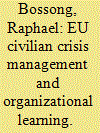

|
|
|
|
|
| Publication |
2013.
|
| Summary/Abstract |
Commentators and policy-makers stress the need to learn the lessons of EU civilian crisis management. Yet despite numerous case studies on mission performance, we know little about the EU's overall capacity for such learning. The first part of this article outlines a theoretical framework for analyzing organizational learning in the context of peace operations. It recommends focusing on administrative reform and conceptual development in Brussels, and lists various factors that are expected to facilitate or inhibit organizational learning cycles. On this basis, the second part presents a historical survey of the EU's learning efforts in civilian crisis management. Despite a dynamic expansion of mission tasks as well as corresponding review processes, organizational learning has remained haphazard and limited to capacity expansion or mission support requirements. Only since 2009 did the EU invest in more formalized lessons-learning processes, which led to more systematic information gathering and more in-depth conceptual discussions. So far, however, these initiatives could not overcome political constraints to more ambitious reforms of EU peace operations.
|
|
|
|
|
|
|
|
|
|
|
|
|
|
|
|
| 5 |
ID:
101325
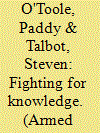

|
|
|
|
|
| Publication |
2011.
|
| Summary/Abstract |
Organizational Learning
Learning Systems
Learning Organization
Social Networks
Australia
Army
|
|
|
|
|
|
|
|
|
|
|
|
|
|
|
|
| 6 |
ID:
049902
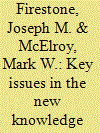

|
|
|
|
|
| Publication |
Amsterdam, Butterworth-Heinemann, 2003.
|
| Description |
xxvii, 350p.Pbk
|
| Standard Number |
0750676558
|
|
|
|
|
|
|
|
|
|
|
|
Copies: C:1/I:0,R:0,Q:0
Circulation
| Accession# | Call# | Current Location | Status | Policy | Location |
| 047358 | 658.4038/FIR 047358 | Main | On Shelf | General | |
|
|
|
|
| 7 |
ID:
122770
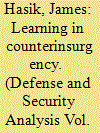

|
|
|
|
|
| Publication |
2013.
|
| Summary/Abstract |
Since the publication in 2002 of John Nagl's Learning to Eat Soup with a Knife, organizational learning has been widely presumed an important ingredient for success in counterinsurgency. But sampling the literature from before and after this time shows remarkably little analytical treatment of the issue of learning and even confusion over what it may mean. This article considers the theories, hypotheses, research strategies, threats to validity, methods of measurement, treatments of time, and general lack of statistical analysis in the work to date and recommends a course for future research.
|
|
|
|
|
|
|
|
|
|
|
|
|
|
|
|
| 8 |
ID:
149020
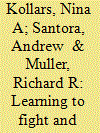

|
|
|
|
|
| Summary/Abstract |
A military cannot hope to improve in wartime if it cannot learn. Ideally, in wartime, formal learning ceases and the application of knowledge begins. But this is optimistic. In 1942, USAAF Eighth Air Force assumed it had the means necessary for victory. In reality, its technique and technology were only potentially – rather than actually – effective. What remained was to create the practice of daylight bombing – to learn. This article (1) recovers a wartime learning process that created new knowledge, (2) tests existing tacit hypotheses in military adaptation research, and (3) offers additional theoretical foundation to explain how knowledge is created in wartime
|
|
|
|
|
|
|
|
|
|
|
|
|
|
|
|
| 9 |
ID:
138744
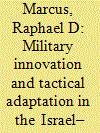

|
|
|
|
|
| Summary/Abstract |
This article highlights a pattern of military adaptation and tactical problem-solving utilized by the Israel Defense Forces (IDF) while engaged in protracted conflict with the Lebanese militant group Hizballah. It discusses the IDF’s recent attempts to institutionalize their historically intuitive process of ad-hoc learning by developing a formal tactical-level mechanism for ‘knowledge management’. The diffusion of this battlefield lesson-learning system that originated at lower-levels of the organization is examined, as well as its implementation and effectiveness during the 2006 Lebanon War. A nuanced analysis of IDF adaptation illustrates the dynamic interplay between both ‘top-down’ and ‘bottom-up’ processes of military innovation.
|
|
|
|
|
|
|
|
|
|
|
|
|
|
|
|
| 10 |
ID:
185260
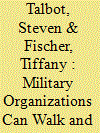

|
|
|
|
|
| Summary/Abstract |
This article is a response to a recent publication by Hasselbladh and Ydén in this journal, entitled “Why Military Organizations Are Cautious About Organizational Learning?” Through their use of dichotomous logic, the authors argue continuous learning poses a threat to the functioning of military organizations. The following commentary argues for a necessary coexistence between the mainstays of the traditional bureaucratic military organization presented by Hasselbladh and Ydén and continuous learning required by military organizations to compete and cope with technological advancements and gray zone challenges afforded by the modern operating environment.
|
|
|
|
|
|
|
|
|
|
|
|
|
|
|
|
| 11 |
ID:
157776
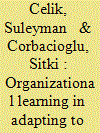

|
|
|
|
|
| Summary/Abstract |
Using a theoretical framework based on complex adaptive systems and organizational learning, the study compares and contrasts the network structures of two disaster response systems following the 2006 avian influenza crisis and the 2011 Van earthquake in Turkey. This study emphasizes the reorganization of Turkish disaster response in 2009 and its impact in response to 2011 Van earthquake. The research utilizes data from content analysis of news reports from the Turkish daily newspapers Cumhuriyet and Sabah from 28 December 2005 to 17 January 2006 for the avian influenza, and Hurriyet from 23 October 2011 to 8 November 2011 for the 2011 Van earthquake, respectively. The research has used social network analysis and small world ratio based on the content analysis data to compare and evaluate the network structures of the two response systems. Findings indicate that the Turkish disaster system, to some degree, learned from the previous disaster and was therefore better managed. However, the system still remained very centralized and multi-sectoral involvement is still weak.
|
|
|
|
|
|
|
|
|
|
|
|
|
|
|
|
| 12 |
ID:
115273
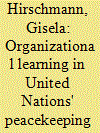

|
|
|
|
|
| Publication |
2012.
|
| Summary/Abstract |
This article illustrates how organizational learning can explain the shift in United Nations' peacekeeping exit strategies from the election-based approach of the 1990s to peacebuilding. Conceptualizing learning as an ideal-type, three-step process, of knowledge acquisition, interpretation and institutionalization, the analysis reveals the impact of new knowledge on institutional change. It demonstrates how knowledge acquisition became systematized within the United Nations' Secretariat especially after 2000, with the active promotion of boundary-spanning activities. The analysis then shows how a shared understanding of the role of peacebuilding for exit strategies was developed by the organization's bureaucracy and intergovernmental bodies in the interpretation step. Finally, it highlights how the establishment of the Peacebuilding Commission institutionalized the transition to peacebuilding as the new exit strategy and how new learning capacities were created. By conceiving the interaction between international organizations and their external environment as a dynamic relationship, the analysis confirms the potential of organizational learning theories for explaining institutional change in international relations.
|
|
|
|
|
|
|
|
|
|
|
|
|
|
|
|
| 13 |
ID:
149490
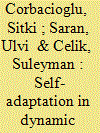

|
|
|
|
|
| Summary/Abstract |
This paper examines the response to the 2006 avian influenza crisis in Turkey. Using complex adaptive systems as the theoretical framework, the paper discusses the extent to which the Turkish disaster management system showed self-adaptation during the crisis. Self-adaptation requires organizational flexibility that facilitates sufficient information flow through technical and cultural infrastructures. This study uses qualitative methods to analyze the data. The research findings indicate that during the crisis, Turkish disaster management was faced with critical difficulties related to organizational, technical and cultural capacities that undermined its capacity to adapt to changing conditions. The system was able to manage these difficulties in seven to ten days; however, Turkey’s contemporary disaster response services still require a transformation to effectively respond to any influenza pandemic.
|
|
|
|
|
|
|
|
|
|
|
|
|
|
|
|
| 14 |
ID:
185259
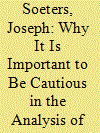

|
|
|
|
|
| Summary/Abstract |
This article is a reply to a recent publication by Hasselbladh and Yden in this journal, entitled “Why Military Organizations Are Cautious About Learning?” They argue that there is good reason for military organizations not being very successful in organizational learning. Based on historical experiences related to the military’s bureaucratic character and specific task environment, they argue that military organization’s hesitation to learn is not necessarily dysfunctional. This reply refutes this assertion as it is not based on sufficient knowledge of organizational learning in general, but more importantly because it “scholarly” legitimizes the impeding of attempts to improve military performance in the broad sense of the word.
|
|
|
|
|
|
|
|
|
|
|
|
|
|
|
|
|
|
|
|
|